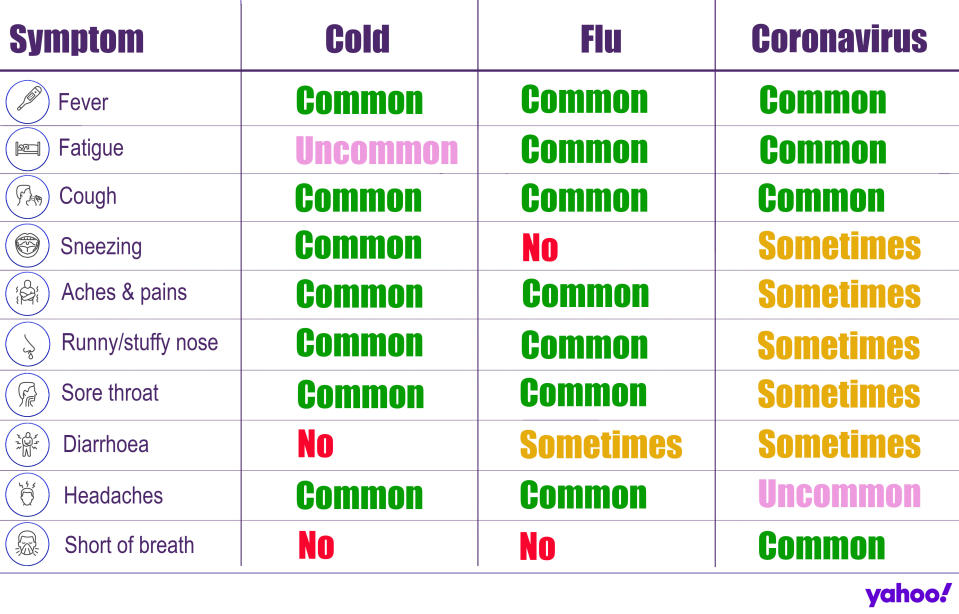Coronavirus terms and what they mean, from epidemic to social distancing

Latest coronavirus news, updates and advice
Live: Follow all the latest updates from the UK and around the world
Fact-checker: The number of Covid-19 cases in your local area
Explained: Symptoms, latest advice and how it compares to the flu
The coronavirus outbreak is continuing to make headlines in the UK, as more people are tested and more cases revealed.
With coverage of a new virus such as this one comes a wealth of rarely-used terms, from epidemic to pandemic and social distancing, which can cause confusion.
These are words we need to get familiar with.
Coronaviruses
Most of us are describing this particular strain of illness as the coronavirus rather than Covid-19.
In fact, coronaviruses refers to a group of viruses that cause a whole host of illnesses. These include illnesses from the common cold to more serious diseases such as Severe Acute Respiratory Syndrome (SARS).
According to the World Health Organization, coronaviruses are “zoonotic” which means they can be transferred from animals to humans.
Common signs of all coronavirus infections include: fever, cough, shortness of breath and breathing difficulties. In more severe cases, infection can cause pneumonia, severe acute respiratory syndrome and even death.

Covid-19
Covid-19 is the official name given to the type of coronavirus we are dealing with at the moment. This strain of coronavirus originated in Wuhan City, China, at the end of 2019.
This disease was named by the World Health Organisation on 11 February 2020 and it officially stands for Corona Virus Disease 2019.
Self-isolation
Self-isolation is a term that has been used a lot recently. Simply put, self-isolation means staying in your home and avoiding contact with other people as much as possible in a bid to stop the spread of the virus.
People who are told by the NHS to self-isolate are asked to stay indoors for 14 days.
The NHS recommends that people who have been asked to self-isolate should not invite visitors over, shouldn’t go to work, school, use public transport or spend time in any other public areas. They also should not share dishes, plates and glasses with anybody else in their home.
Social distancing
This is another example of limiting the spread of the disease by reducing contact with other people.
Social distancing, which means maintaining one-metre space, measures might include closing schools, home working and the reduction of large-scale public gatherings.
Unlike self-isolation, it doesn’t require people to stay in their homes and instead just take necessary precautions to reduce human contact.

Community transmission
When this strain of coronavirus first arrived in the UK, it was mostly contracted by people who had travelled to an affected area such as China and later Italy.
Many people also contracted it through friends and relatives who had the disease.
Community transmission refers to the group of people who have contracted Covid-19 having never been to an infected country or been in contact with somebody who has the virus.
Epidemic
An epidemic is a widespread outbreak of an infectious disease in a geographical area. Before the coronavirus spread to the rest of the world, it was described as an epidemic within Wuhan, China.
Pandemic
A pandemic is a disease that is spreading across multiple countries at the same time. Ultimately, it’s when an epidemic spreads.
The coronavirus outbreak has recently been upgraded to a pandemic based on its prevalence in so many countries.
WHO chief, Dr Tedros Adhanom Ghebreyesus, made this call after cases outside of China increased 13-fold in two weeks.
Upgrading a disease to a pandemic doesn’t change the way that countries should manage diseases, per se, it’s simply a name to describe the current situation.
Endemic
An endemic is a type of disease that exists permanently in a particular location. An example of an endemic is malaria within certain parts of Africa.
Unlike an epidemic and a pandemic, it’s an ongoing issue with no “end” date.
Outbreak
An outbreak is a term used to describe how many cases of the coronavirus there has been. When something is described as an outbreak, it means there are more cases than expected of a particular virus.
Containment phase
The UK has three main phases of managing the coronavirus outbreak; containment, delay and mitigation. These will all progress alongside a fourth phase; research into how and why the disease is spreading.
The containment phase refers to steps to stop the disease spreading across the UK for as long as possible.
This phase includes tracing who infected people have come into contact with as well as detecting cases of Covid-19 as early as possible.
Delay phase
The second phase of the UK’s action plan is known as the delay phase.
This phase will aim to reduce the peak impact of the disease and might include certain measures like social distancing - the restriction of public gatherings being an example of this.
Mitigation phase
At this stage the government will ensure that support is directed towards hospitals so that they have everything they need to maintain essential services.
This stage is more about reducing the impact of the disease on the overall society by giving citizens everything they might need to recover as quickly as possible.
Category one traveller
People who have travelled to and from certain areas since the outbreak are split into two categories; one and two.
People who fall into category one should self-isolate immediately whether they are feeling symptoms or not.
These places include: the Hubei Province in China, Iran, northern Italy, or Daegu and Cheongdo in South Korea.
Category two traveller
People who fall into category two are people who have visited the following countries: Japan, Cambodia, Thailand, Vietnam, Malaysia and Singapore.
These people should only self-isolate if they’re feeling unwell and call NHS 111 if they develop symptoms.
Additional reporting PA.



